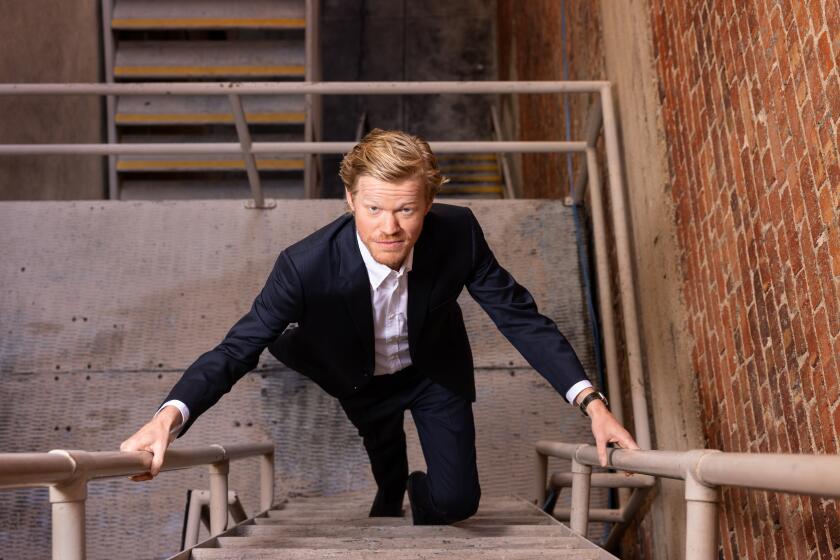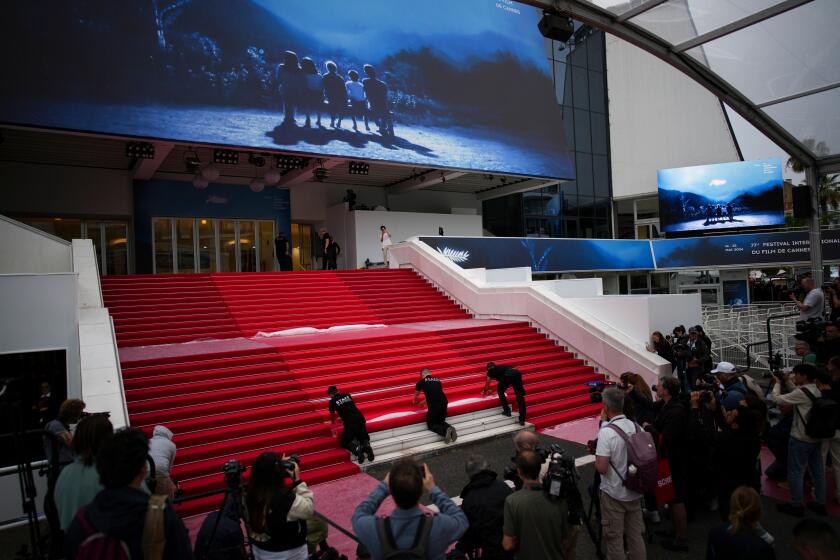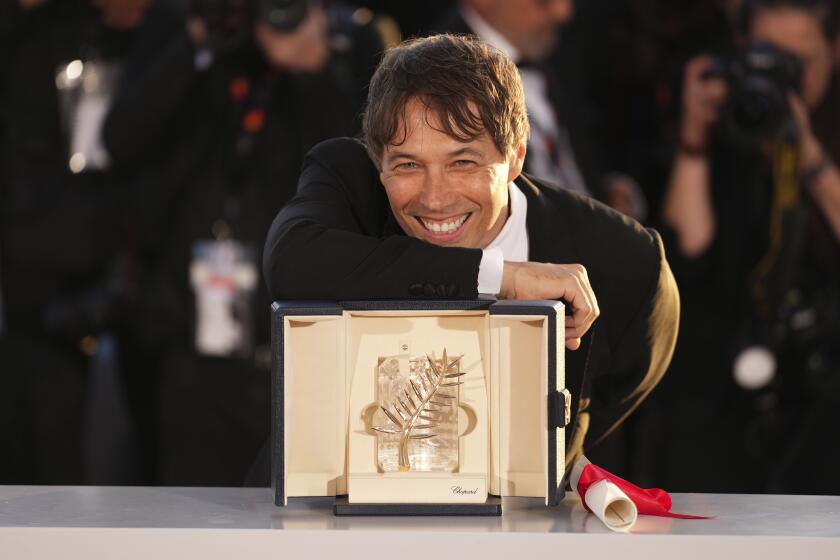Baz Luhrmann’s unruly ‘Elvis’ shakes up the Cannes Film Festival
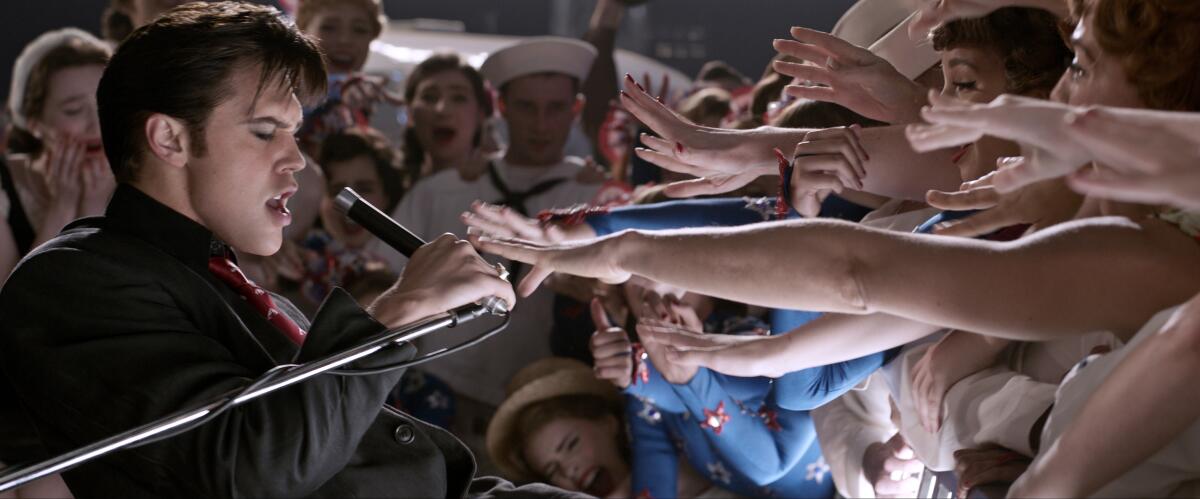
- Share via
CANNES, France — Elvis Presley famously never got the overseas touring career he deserved. He played only three venues outside the U.S., all of them in Canada in 1957, well before reaching peak superstardom. Instead of going international, he remained a fixture of the International Hotel in Las Vegas from 1969 to 1976, performing show after sold-out show until just a year before his death. Keeping Presley tied to Vegas was just one of the many machinations of his ruthlessly exploitative manager, Col. Tom Parker, who, it’s now widely believed, was afraid to leave the U.S. after having immigrated there illegally from the Netherlands years earlier.
That sad history is unpacked at some length in “Elvis,” Baz Luhrmann’s unsurprisingly extravagant new movie about Presley’s life, art and career, which had its world premiere Wednesday night at the 75th annual Cannes Film Festival. (Warner Bros. will release the film June 24 in U.S. theaters.) Presley may never have gotten to perform for his fans in France, but Cannes gladly rolled out the red carpet for Luhrmann and his stars, Austin Butler, who makes a credibly charismatic Elvis, and Tom Hanks, who makes Col. Parker every inch the self-serving scumbag. Defensive and self-pitying, Parker narrates this long and gaudily overstuffed tale of a King and his Kingmaker, arguing — unpersuasively — that he isn’t the villain that history has made him out to be.
The problem is that while Parker is very much the villain of “Elvis,” Luhrmann has also gone out of his way to make him something of a co-protagonist. Ordinarily I like it when Hanks cuts against the good-guy grain, but his work here is hammy, grating and unmodulated to a fault, accomplished with a combo of fat suit, prosthetic jowls and over-the-top accent that makes Colin Farrell’s Penguin and Stellan Skarsgard’s Baron Von Harkonnen look positively restrained. It also adds unnecessary narrative padding to a movie that clocks in north of 2 1/2 hours, and which would earn more of that running time if it weren’t repeatedly forcing its ostensible subject to share his spotlight.
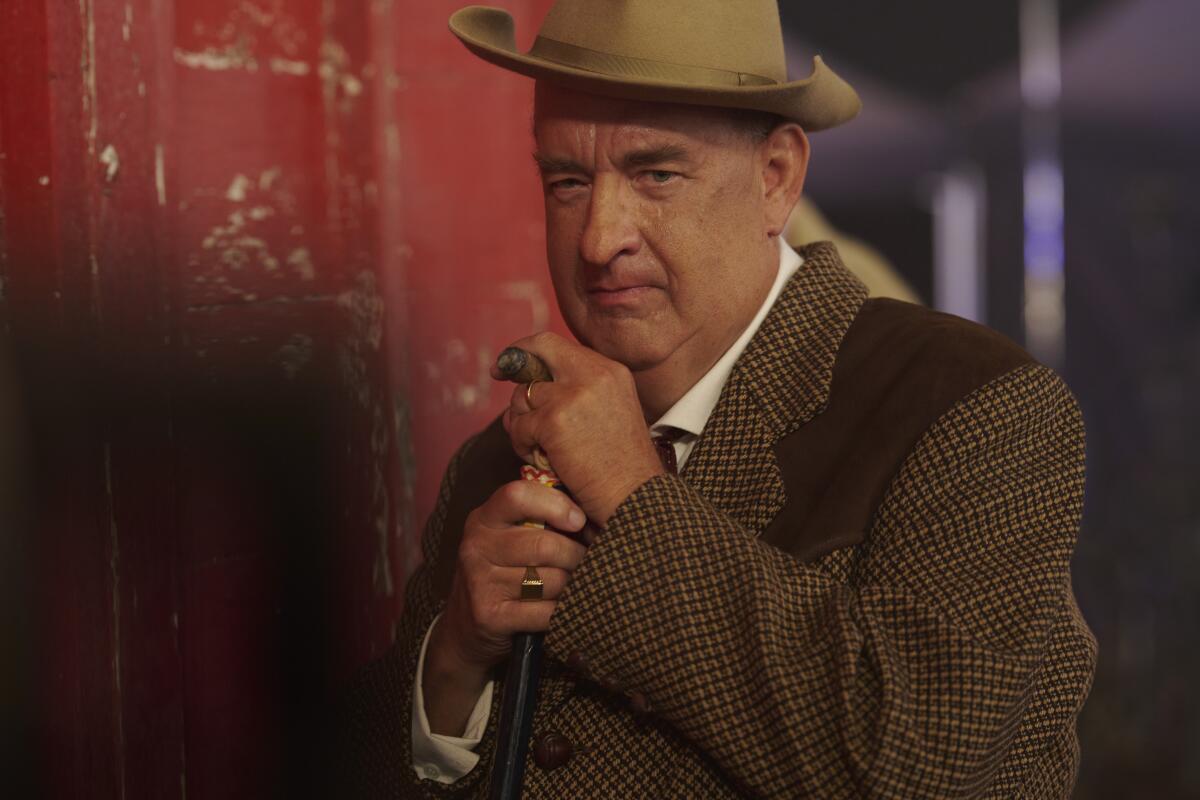
It’s a shame, because in many other respects, “Elvis” feels like an intuitive and sometimes even ideal match of filmmaker and subject. Luhrmann doesn’t do much by halves, and here his flamboyant stylistic excesses are very much of a piece with Elvis’ own. The performance sequences crackle with live-wire energy, even when Luhrmann is drawing them out or even slowing them down. (A blissful early scene of a glammed-out young Elvis getting a crowd of women all shook up — and unleashing wave after wave of pink-suited pelvic gyrations — seems to go on forever.) Sometimes Luhrmann will play the concert footage in sizzling black-and-white; sometimes he’ll split the screen not into quadrants but octants. It’s all a bit much, which means it’s just right.
Butler is a decent physical match for Elvis and a better one vocally. While that’s often the real Presley you hear singing in the movie, the wall-to-wall soundtrack also teems with Butler-recorded covers of “I’ll Fly Away,” “Blue Suede Shoes,” “Heartbreak Hotel,” “Hound Dog” and “Can’t Help Falling in Love,” among others. Some effort is made early on to locate Elvis’ musical and spiritual origins in the churches and revival tents of Mississippi, and also to confront his oft-contested legacy as a performer and appropriator of Black music. Among the key Black artists seen briefly here are B.B. King (Kelvin Harrison Jr.), Arthur “Big Boy” Crudup (Gary Clark Jr.), Sister Rosetta Tharpe (Yola), Little Richard (Alton Mason) and Big Mama Thornton (Shonka Dukureh).
Before long, Col. Parker catches on to the bottomless commercial potential of an artist who could “sell a Black sound with a white face,” as Presley was described in Eugene Jarecki’s excellent 2018 documentary, “The King.” That film pointedly drew a parallel between the waste and decadence of Presley’s ignominious final years and the moral complacency and confusion of Trump’s America. By contrast, Luhrmann’s “Elvis” largely keeps politics and larger metaphors at bay; it’s content to spin a conventional, crowd-pleasing narrative of an iconic artist’s rise and fall.
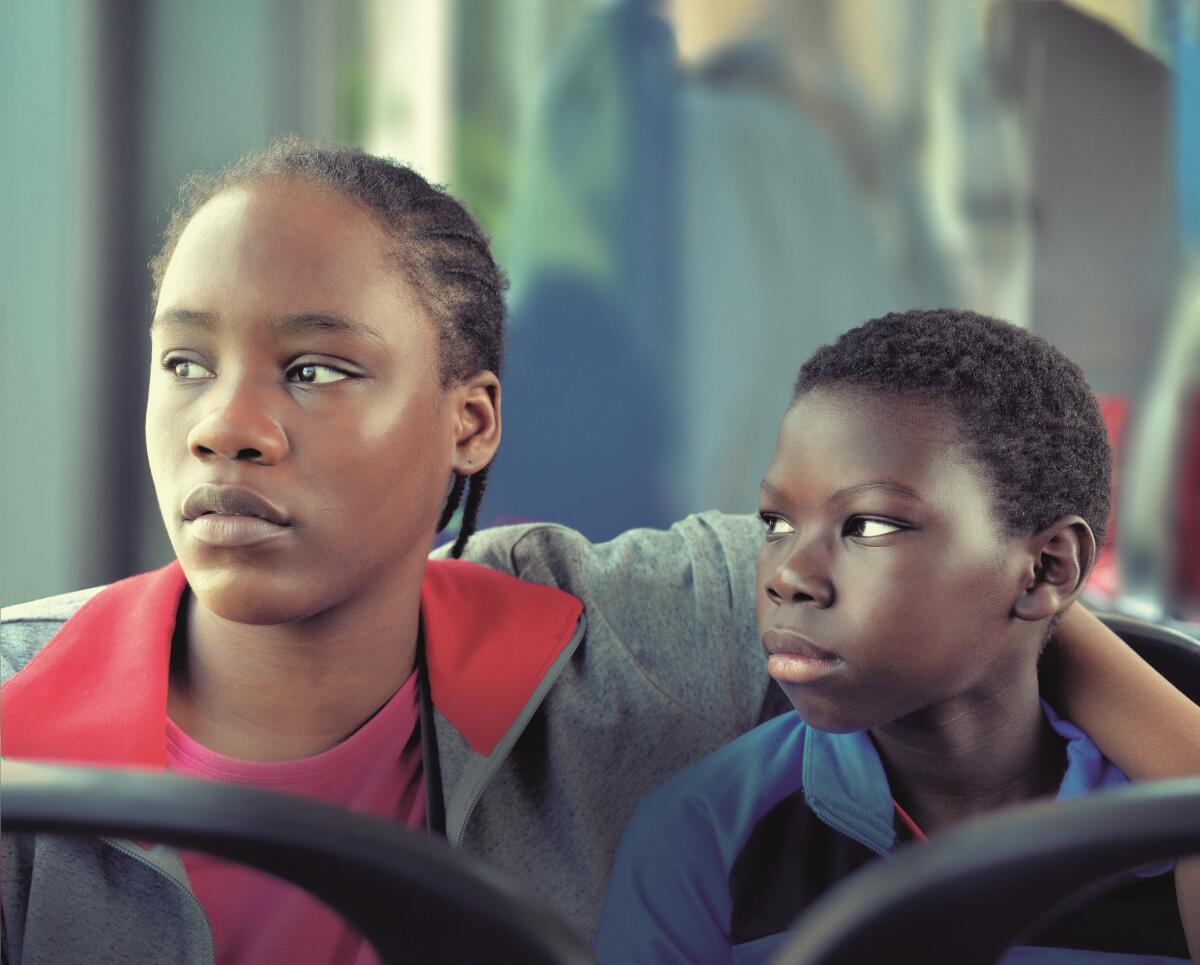
And so we see Elvis’ career triumphs, his meteoric ascent to the top of the charts and his proud defiance of the conservative-minded squares who tried to keep his devilish dancing under control. We see his tempestuous marriage to Priscilla (a sympathetic Olivia DeJonge); his neglect of his daughter, Lisa Marie; and his years struggling with addiction and depression, most of which play out in a sprawling Vegas penthouse suite that looks more like a prison in every shot. To complain that “Elvis” is basically a compilation of musical-biopic conventions is a bit like complaining about a greatest-hits album; it also misses one of Luhrmann’s strengths as a filmmaker, which is his ability to suffuse clichés with sincerity, energy and feeling.
Those gifts were on unimprovable display in Luhrmann’s “Moulin Rouge,” which kicked off the 2001 festival in high style. That was the first edition of Cannes programmed by its longtime artistic director, Thierry Frémaux, and the opening-night selection of “Moulin Rouge” was a major coup that improved relations between the festival and Hollywood, which had grown somewhat reluctant in the ’90s to bring studio films to the Croisette. Luhrmann would return to open the 2013 festival with “The Great Gatsby,” which, like most opening-night films, was forgotten within a few days’ time but nonetheless felt like an ideal starter for an event where art, commerce, glamour and silliness exist in near-perfect balance. To that end, “Elvis” wouldn’t have been a bad choice of Cannes opener this year, though I suspect that Warner Bros., which has high hopes for the movie when it’s released next month, wanted to avoid the harsher critical scrutiny that often comes with an opening-night reception.
And so “Elvis” landed late in the festival and played outside the main competition, which has produced a number of strong entries as it enters its final stretch. One of the most roundly admired so far is “Tori and Lokita,” the best work in nearly a decade from the two-time Palme d’Or-winning Belgian brothers Jean-Pierre and Luc Dardenne. Running a taut 88 minutes (which means you could watch it almost twice in the time it would take you to get through “Elvis” once), the movie follows two African immigrants, 11-year-old Tori (Pablo Schils) and 16-year-old Lokita (Joely Mbundu), who are posing as brother and sister in an unnamed Belgian city. There, they struggle to survive and forge a life for themselves, finding themselves at the nonexistent mercy of drug dealers, sexual abusers and corrupt church leaders alike.
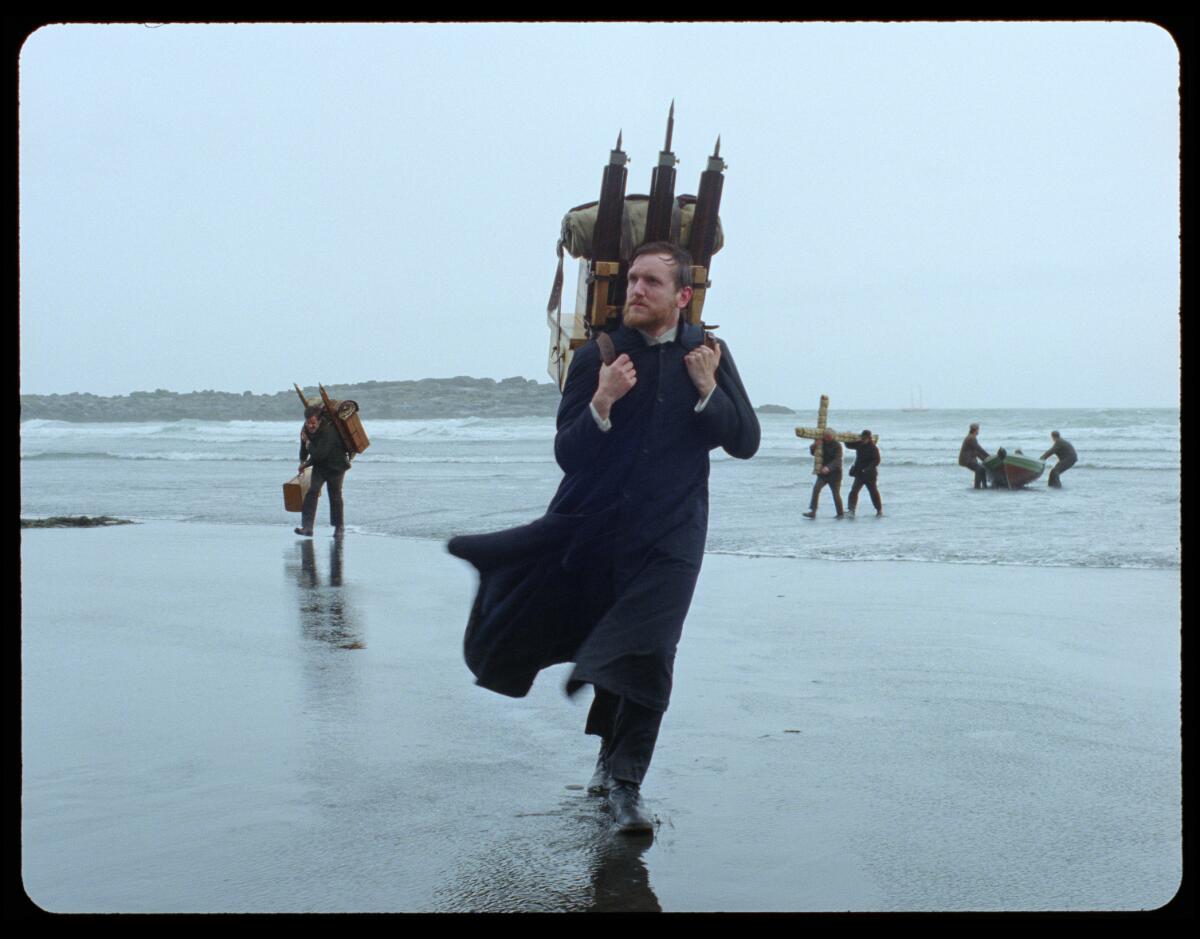
The Dardennes don’t announce all this upfront. As usual, their method is to drop you right into a swift, relentlessly naturalistic story in which character and circumstance are frequently revealed in a flurry of white-knuckle action. What unfolds is an infuriating tale of exploitation, in which the very hope of a better life is repeatedly weaponized against Tori and Lokita, luring them into ever more despair-worthy conditions of enslavement. And yet even in a drama whose every development is motivated by material need — and even with a devastating wallop of an ending — the Dardennes somehow push their way to an impossible state of grace.
Another outstanding drama about the challenges of survival in a strange land could be found in the masterful “Godland,” though unlike the furiously paced “Tori and Lokita,” this one is a long, slow burn — or perhaps a long, slow thaw, given its chilly Nordic setting. Mysteriously absent from the main competition (it premiered in an adjacent strand of the festival called Un Certain Regard), this latest drama from the Icelandic writer-director Hlynur Pálmason (“A White, White Day”) follows a Danish priest, Lucas (Elliott Crosset Hove), who is called on to build a church in the frigid north. The difficulty of the journey is, in some ways, exacerbated by the clergyman’s own pretensions and delusions; life proves no more hospitable when he finally reaches his destination.
Magnificently shot in a nearly square frame with rounded corners, an aesthetic that evokes the old photographs that Lucas likes to take in his spare time, “Godland” tells a story of natural wonder, elemental beauty and human folly. Hove makes Lucas a boldly repellent protagonist, a one-man rebuke to the idea that faith necessarily endows anyone with foresight, humility or kindness. His story has some of the bleak, fatalistic wit of “A White, White Day”; it also has that movie’s excellent star, Ingvar Sigurðsson, who serves as both Lucas’ guide and his nemesis. By the end you’re grateful to have experienced this long and treacherous journey with them, even if neither of them can say the same.
More to Read
Only good movies
Get the Indie Focus newsletter, Mark Olsen's weekly guide to the world of cinema.
You may occasionally receive promotional content from the Los Angeles Times.




